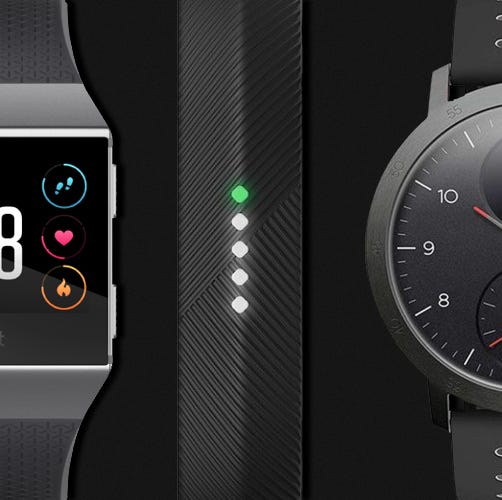
Fitbit has become a proprietary eponym, like Kleenex or Xerox. While they may have started out as relatively simple activity trackers, the wearable devices have evolved considerably over the past decade or so—and with them the fitness tracker and smartwatch industry as a whole. You can still find plenty of basic fitness watches that are intended to be worn all day and mostly forgotten about until you want to check your stats and activity. But you can also get much more full-featured smartwatches or GPS-enabled fitness trackers that can guide and monitor you through a range of sports and activities. Many of these wearables can also now even stand-in for a smartphone, and do things like receive texts, play music, or make payments.
That means choosing one to put on your wrist is more difficult decision than ever. We’ve curated some of the best current fitness-minded wearable devices here to aid you in your decision-making, whether you’re just looking for an everyday fitness tracker or something more advanced for training and exercise.
How We Chose These Fitness Trackers
To select these devices, we relied on our own experience and previous Popular Mechanics coverage and testing of fitness trackers and smartwatches. We also surveyed the market and took customer reviews as well as professional reviews from trusted publications like Wired, Ars Technica, and PC Magazine, into account.
Best Overall: Fitbit Ionic

$248.00
This serious contender in Fitbit’s smartwatch repertoire packs a serious punch. It takes everything the Versa (below) has and adds a few notable features, most of all, onboard GPS. That means that pace, distance traveled, and speed can all be on your wrist, even when your phone is at home.
For some this might not be a big deal, but if you are one who likes cycling, hiking, or running without a phone bouncing around, that could be a big difference.
The Ionic also has a durable Gorilla Glass 3 screen but packs it in a sleeker, more intense case. You can also get the Ionic Adidas edition, which will give you training regiments and coaching straight from the brains of Adidas.
If you’re looking for the latest and greatest in tech, though, be warned, neither the Ionic or the Versa is capable of making a phone call.
Best Budget Smartwatch: Fitbit Versa Lite

Fitbit’s original Versa is still a solid option if you’re looking for a full-featured and affordable alternative to the likes of the Apple Watch, but the company’s newer Versa Lite model will save you even more money if you don’t need quite all those tricks.
You still get plenty of fitness capabilities, including heart rate and sleep tracking, but lose out on some more advanced features like on-screen workouts and logging of swim laps and elevation (not to mention on-board music storage). The features the watch retains, combined with its lower price, makes it a favorite of Wired, which named the Versa Lite its top all-around fitness tracker.
Best Design: Fitbit Charge 3

The first noticeable difference with Charge 3 is its width. Whereas the other trackers thus far have had thin wristbands, the Charge 3 approaches the size of a real watch. With that comes the larger screen where you can easily see all your information. The Charge 3 has all of the same fitness-tracking features as the Alta HR with a few great additions, like floors climbed, 15 modes for tracking different activities (including swimming), as well as piggybacking off your phone’s GPS to display your pace and distance.
The Charge 3 also adds a number of coaching features, including guided breathing exercises for some midday relaxation, and female health tracking to log symptoms and predict ovulation and fertility windows. The charge also adds a few smartwatch features like Fitbit pay for easy transactions from the wrist, and notifications with real information in them, like how far away your Uber is.
Plus, it comes with five quick replies to respond to texts from your wrist, but you can change and personalize them to reflect what you might actually say.
Best Everyday Tracker: Fitbit Inspire HR

Fitbit’s Inspire and Inspire HR models (the “HR” indicating that version can measure your heart rate) sit right in the middle of the company’s product family, ideal choices for anyone who wants to step up from the most basic trackers while still keeping things simple and straightforward. The Inspire replaces Fitbit’s previous Alta and Alta HR models and offers a larger display and more capable touchscreen (you could only tap on Alta’s interface; this one works with swiping, too). There are also new features like multiple watch faces, which both Runner’s World and Ars Technica found to be welcome upgrades. Those do come at some expense to battery life, however.
Like many basic trackers, it doesn’t have built-in GPS, but it can sync with your smartphone via Bluetooth to track your routes and check your pace. And as with the Alta, you can swap out different bands to suit your taste.







